There are a lot of articles online about how to become a freelance writer. Maybe you’ve already read a dozen or so yourself. But let me ask you something.
Did any of them help?
Don’t get me wrong. There’s a lot of good advice about how to be a freelance writer in most of those articles. They’re at the top of Google search results and get tons of shares, links, and pageviews for a reason.
But do you still have questions you need answered? Practical, meat and potatoes questions? Stuff like:
Let’s say you’ve already dipped your toes into the gig, and you have questions like:
It’s also possible you ran into a lot of advice that just… doesn’t apply to what you want.
For example, there are tons of articles to help writers launch and manage websites that (might) start earning you real revenue over the course of a year or so.
Some articles promise training programs from writing gurus that’ll teach you how to break in and start making thousands of dollars in your first couple months.
In fact, there are so many of these, the whole “I’m a writer and I work from the beach and made $150,000 last year” is practically a cliche.

We’re not making fun, I promise. ProWriter has skills courses and other resources to help writers launch their careers too. We’re not knocking it.
But how many of you just plain don’t want to start your own website that *might* make you money later?
How many of you don’t want to pay hundreds of dollars for training courses that teach you a style of writing you’re not sure you want to pursue?
How many of you are:
Did we get everyone? Now let me ask you more directly:
“Did any of those articles teach you how to start freelance writing?”
I mean really teach you.
Like, “make you feel confident that you understand exactly how the freelance writer market works, exactly how to start making money sooner than later, and exactly what you should do to keep clients happy and paying,” teach you?
For me, most of those articles are missing something. And what’s missing is pretty straightforward — no-nonsense, practical advice for becoming a real, professional writer.
And that’s what we want to give you in this article.
If that sounds like what you’re looking for, feel free to skip to the next section.
If you still have doubts, stick with us while we explain why, in contrast to every other freelance writing guru and every article you’ve read so far, we’re uniquely qualified to be giving you this advice.
There are a ton of articles online about how to become a freelance writer.
In fact, there are millions.

Millions and millions.

So why should you listen to what we have to say on this topic as you do your research on freelance writing?
What makes our take unique? What do we know that everyone else misses?
It’s simple:
Other articles only give you half the story. They’re written by freelance writers who have found a level of success in this market. They have found their niche, have reliable, recurring clients, and command high payouts.
They write those articles to boost their websites so that they’re easier for clients to find. Or, like ProWriter, they offer products and services to writers, including training, consulting, or content like ebooks and webinars.
We’re not knocking them. We love to see freelance writers find success.
But they can only tell you half the story.
To really understand this market and the paths to breaking in as strategically as possible, you also need the employer side.
This is the approach ProWriter takes to freelance writing.
We ran a digital content agency for 5 years, and worked with clients in every industry and niche imaginable.
In that time, we:
As an agency, we acted as content strategy partners with our clients, and as mediators between the client/writer relationship. We asked tough, probing questions of our clients to figure out exactly what kind of content helped them succeed. Then we hired and trained writers to provide it.
And it was all part of our grand plan (cue evil laughter) to study the freelance writing industry so that we could create ProWriter. It was an educational experience, to say the least.
But in those 5 years, the most important lesson we learned is that there’s something missing from the freelance writing market:
There’s a huge divide between what a client thinks a writer can do, and what a writer can actually do.
It’s nobody’s fault.
There are many different kinds of freelance writers out there, each at a different level of skill and experience. Many employers assume, naively, that any writer they hire is a professional that knows everything there is to know about content.
Additionally, since employers don’t tend to be content experts themselves, they often have outdated ideas about what makes content work, have trouble explaining exactly what they want, and expect writers to work miracles.

That’s not all.
On the writer’s side, it’s difficult to figure out exactly where and how to break in during their first 12-18 months on the job.
Even though there are millions of articles on the topic of freelance writing out there, a good many are light on actual, tactical details. They’re filled with generic advice like “never stop writing!” or “start a blog!”
Additionally, we found out that not every writer wants to build a microsite empire or become a content guru that sells products and services to other writers.
They just want to be able to get the gigs they want today.
Even if you do want to become a writing guru, it can take years to get to that level, and frankly, you gotta eat between now and then!
.gif)
A freelance writer’s biggest challenge in their first year is figuring out how to earn enough money to make freelance writing worthwhile. That means picking the right jobs, getting the right experience, and, yes, a lot of luck.
The problem, like we said, is that there’s a huge gap in skills in the market.
The best freelance writers have spent years pulling tricks from PR, marketing blogs, and copywriting. They continue to invest in their professional development, and follow trends in their niche so they can stay competitive.
But that’s not most writers. Many get stuck in low-paying jobs and eventually burn out in the first 12-18 months. They simply can’t find the ladder.
Imagine being stranded in another country for 12-18 months with zero resources. The only way to get ahead is to learn the language, but you have to do it from scratch.
That’s what freelance writing is like for many new writers.

But it doesn’t have to be that way.
If you’re going to succeed, you need to learn the language.
That’s the unique insight ProWriter offers.
We come from the employer side of the freelance writing market.
We’ve worked with hundreds of writers.
We know exactly what clients in every industry want.
We have a deep understanding of the skills writers are missing.
We have the teacher’s answer book. And we want to give it to writers in their first 12-18 months so they don’t have to figure it out from scratch.
It’s a competitive market, and you deserve a fighting chance.
ProWriter’s resources for new writers won’t teach you how to launch websites that might make money a year from now, or how to sell services as a writing guru. There’s plenty of stuff out there that can help you do that.
We want to help writers get their feet wet and survive those first 12-18 months.
We want you to understand:
That’s what makes ProWriter different from everything else you’ve seen so far.
If you’re still feeling a little discouraged, take a deep breath.
You’re gonna be okay.
There’s a lot of content on how to become a freelance writer out there. It can feel a bit like trying to find your way in a thick fog.
Stick with us a little bit longer. We’ll give you some real, meat and potatoes tips for your first 12-18 months in the next section, and by the end, you’ll know whether or not you think you can do this freelance writing thing.
Let’s go!
This article is primarily for aspiring writers who want to learn how to start freelance writing with no experience. Those with zero understanding of how freelancing works, where to begin, and what to expect.
But if you’ve been at it for a little while now and are feeling stuck, or just aren’t seeing the success you want to see, treat this article as a giant REBOOT BUTTON for your career.
You can still right the ship, you just need someone to tell you what to focus on and the strategic moves which, when made quickly, will start showing real payoffs.
We spent a lot of the last section talking about how there’s a huge gap in skills in the market.
Newer writers are simply unprepared for the jobs employers need doing, and this leads to bad experiences for both sides.
Writers typically learn by experience. They identify a freelance writing niche, apply for jobs, fail a lot in the first couple years, and sooner or later, get into their groove and start building some success.
The problem with this approach is that they inadvertently leave a lot of disappointed clients in their wake.
We saw this all the time when we ran a content agency. Matching the wrong writer to a job they weren’t prepared for resulted in angry clients who had to edit and rewrite the work we gave them.
It usually cost us the relationship.
Sure, it’s not always going to work out. You will disappoint clients.
But this isn’t an exception in freelance writing. It’s a norm.
Why does this happen? Because of the state of the freelance writing market.
Employers need content, but they often hire inexperienced writers (because they are the cheapest), have bad experiences, and then devalue the work of freelance writers in general.
It’s not just employers who get hurt. This also makes it difficult for the professional freelance writers further on in their careers who ask for (and deserve) higher payouts. Every professional freelance writer has horror stories about employers who asked for the moon at entry-level writing rates. We ran into plenty of this ourselves.
Employers undervalue writers because by looking to save on content creation, they often receive non-value content.
The state of the market is exactly this: employers want the best possible deal in a writer, and often end up hiring newer freelance writers who can’t do the job. Neither knows any better, and the cycle continues. This hurts everyone.
So what’s the answer?
On day one, a new freelance writer needs to recognize that they are a professional.
Don’t resign yourself to making novice mistakes and “learning as you go.”
Be a professional.
Have a plan.
Learn new skills.
Grow your career strategically.
You shouldn’t look to your clients for advice. You’re the content expert.

This means you need a good idea of what a freelance writer actually is.
Contrary to a popular belief I have heard from many novice freelancers, sitting down with no plan, writing what comes to you, giving it a quick edit, and hoping it’s enough is, in fact, not enough.
Misunderstanding the role and getting stuck in low-pay gigs is discouraging, creates bad habits, and doesn’t help you learn anything.
The professional freelance writer understands their role, their purpose, and their product.
Let’s set the table with a definition of freelance writing that covers almost every form of freelance writing you can cut a decent paycheck out of:
Your job as a freelance writer is getting a reader engaged and keeping them engaged.
That’s it.
“But how?”
By always creating content that is fun and interesting to read.
No matter what kind of freelance writing you go into, that’s your goal.
This is something you need to hang onto. We’ll come back to it often. Everything connects to this idea, so remember it.
With this as your foundation, your goal, your purpose as a writer, you need to focus on three key areas in your first year if you want to become a professional writer.
This article is not going to be enough to turn you into the freelance writer of your dreams. No article is.
But we won’t waste your time with generic points about “never giving up.” You already know you should never give up.
We’re not going to tell you to start a blog. That’s a good idea, and all that needs to be said about it is that it’s a good idea. There, we said it. Let’s move on.
The truth is, you can fit your entire first year as a freelance writer into these three buckets we’re about to cover.
If you can wrap your mind around these three areas of focus, they will guide you through those first 12-18 months and put you on a track to becoming the kind of freelance writer you want to be.
Let’s not waste any more time.
Like we’ve said before: there’s a huge gap in skills in the freelance writing market.
If you want to stand out when you apply for jobs and pitch potential employers, and if you want to secure recurring work from happy clients, start by focusing on hard skills development.
Why is this so important?
If this is your first day as a freelance writer and you’re starting from scratch, chances are you don’t know how important tilecraft is.
You probably don’t think about how an article’s introduction is carefully crafted to hook a reader’s attention.
It’s likely you don’t know any of the persuasive or copywriting tricks that keep readers engaged through an entire piece of content, no matter how long it is.
Even if you’ve been a writer for a little while now, how many of you put a headline on at the very end, giving little to no extra thought to its composition?

(It’s okay. I’m not picking on you. It was me too for a long time.)
So let’s fix that.
We’re about to introduce you to some of the main skill areas every writer needs to work on developing.
Let’s start with...
I don’t know if you know how much thought writers and editors put into their titles.
I’ll tell you. A lot of time. Take your guess and quadruple it.
Some copywriters think that you should spend as much time coming up with a good title as you do on the entire article.
Look at the title of this article.
It was one of 30 options.
30.
And that’s on the low end. Some expert copywriters and marketers will write hundreds of headlines per piece of content.
HUNDREDS.

Don’t worry. I’m not going to tell you that you need to write hundreds of headlines per article.
I won’t tell you that you need to spend as much time crafting a title as you do an entire article, either.
It’s very unlikely that in your first year you’ll have a gig with that much pressure on the title (and well-paid enough to justify the effort on your part).
I just want you to get the idea that in freelance writing, the headline is HUGE.
Some stuff to keep in mind here:
So how do you write good headlines?
Google “write good headlines” and see how far you can go with this topic. It’s a subject unto itself. But there are some best practices every writer should know, and that will serve you well in your first 12-18 months.
We cover many in ProWriter’s free lesson on titles, so I highly recommend checking that out. But a good title is the mix of:
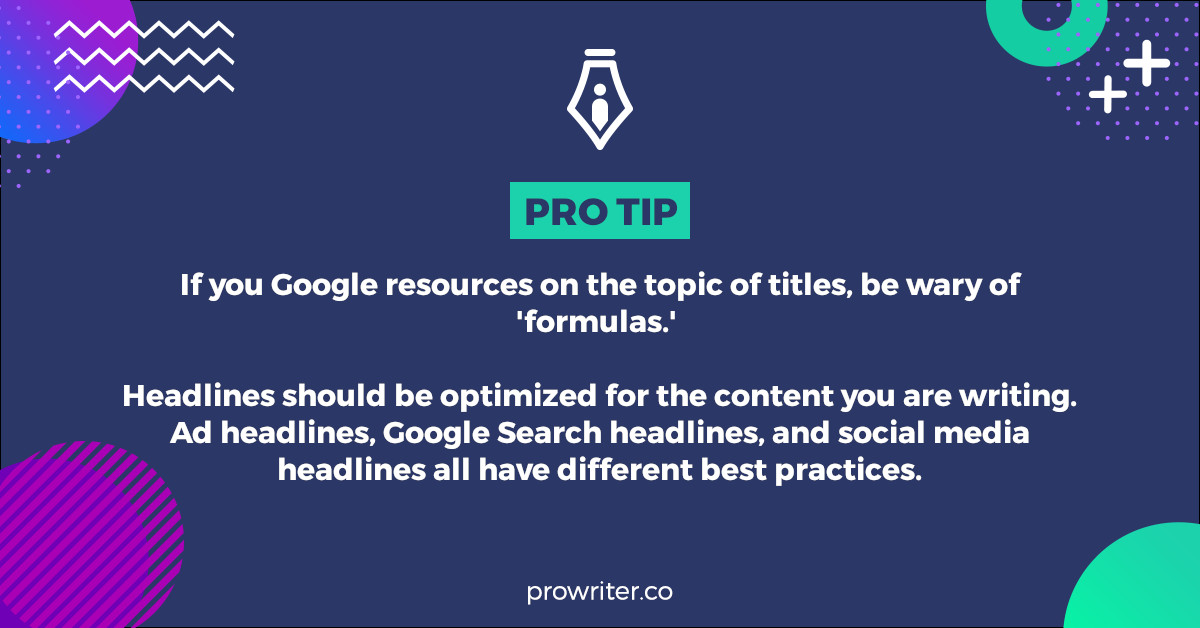
Next up...
It shouldn’t even need to be said, right?
You’d be surprised.
I can’t tell you how many writers I’ve hired who turned in error-filled copy, and when asked about it, sheepishly replied that they’re “still learning.”
There is no faster way to sink your credibility as a professional writer than turning in copy with grammar and mechanics errors.
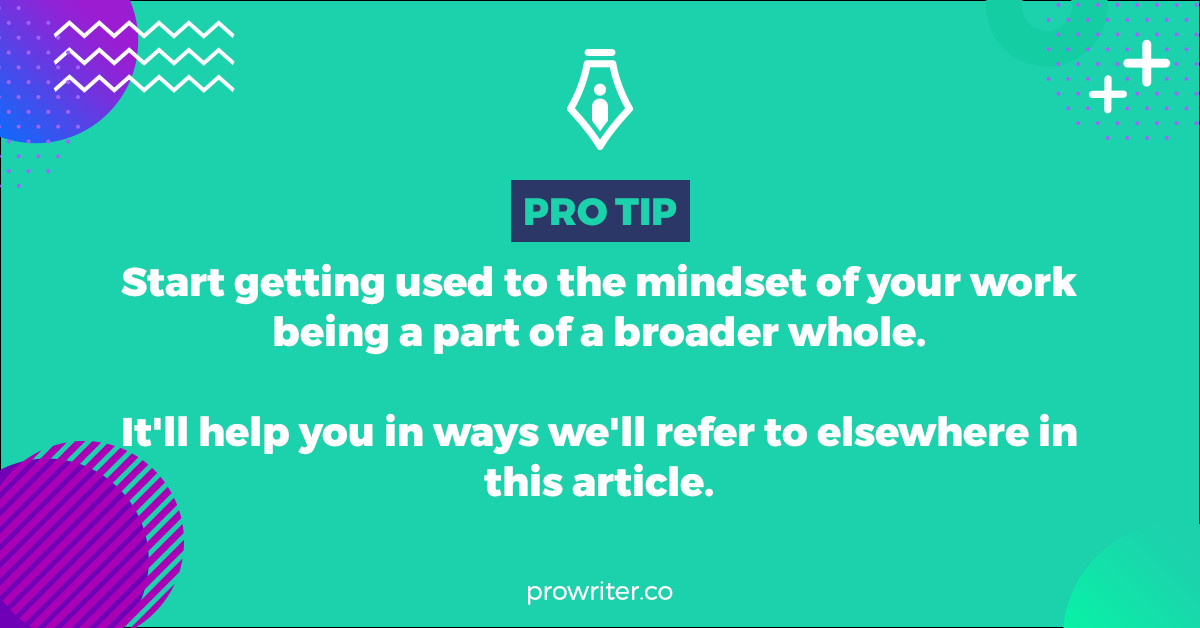 Content moves quickly these days. Very often, there is no editor looking over your shoulder. And even if there is, an editor’s role is typically less focused on grammar and spelling, and more focused on fact-checking, content organization, and readability.
If you are iffy on anything related to grammar and mechanics, tighten that screw immediately.
Good sentence structure, appropriate punctuation use, proper spelling (especially of names), the difference between “there” “their” and “they’re,” all of it.
You should be able to teach the English language. Don’t settle for anything less, because your clients won’t.
Moving on to...
Content moves quickly these days. Very often, there is no editor looking over your shoulder. And even if there is, an editor’s role is typically less focused on grammar and spelling, and more focused on fact-checking, content organization, and readability.
If you are iffy on anything related to grammar and mechanics, tighten that screw immediately.
Good sentence structure, appropriate punctuation use, proper spelling (especially of names), the difference between “there” “their” and “they’re,” all of it.
You should be able to teach the English language. Don’t settle for anything less, because your clients won’t.
Moving on to...
Good grammar and mechanics are the low-hanging fruit of good writing. But you’re not done yet.
A true professional writer also has a sense of what makes content easy to read.
This isn’t necessarily a natural skill. Personally, I’m prone to writing long sentences and using big vocabulary words.
But I’m not Faulkner. I need to write content that is fun and interesting to read, remember?
Readable content emphasizes:
This means that as you write, you need to shoot for:
Content that is not optimized for readability will contribute to a high “bounce rate” for the website it’s published on. A bounce rate is, in layman’s, the rate at which people click onto a site and then immediately “nope” on out of there.
It’s important to note that a high bounce rate is not always the writer’s fault. Bounce rate can also be indicative of a poorly-constructed site, a slow loading speed, or even unattractive presentation and overall bad user experience.
If a client ever tries to blame a high bounce rate on your work and you know you’re doing everything else right, it’s absolutely possible it’s not you, and they’re full of crap.
But if your copy is overwritten, if you try to be “clever” and impress readers with complex prose and big vocabulary words in giant blocks of text you yourself wouldn’t read, then it might very well be you.
Get to the point.
Write with minimalism in mind.
If you can make a point in 6 words instead of 12, do it.
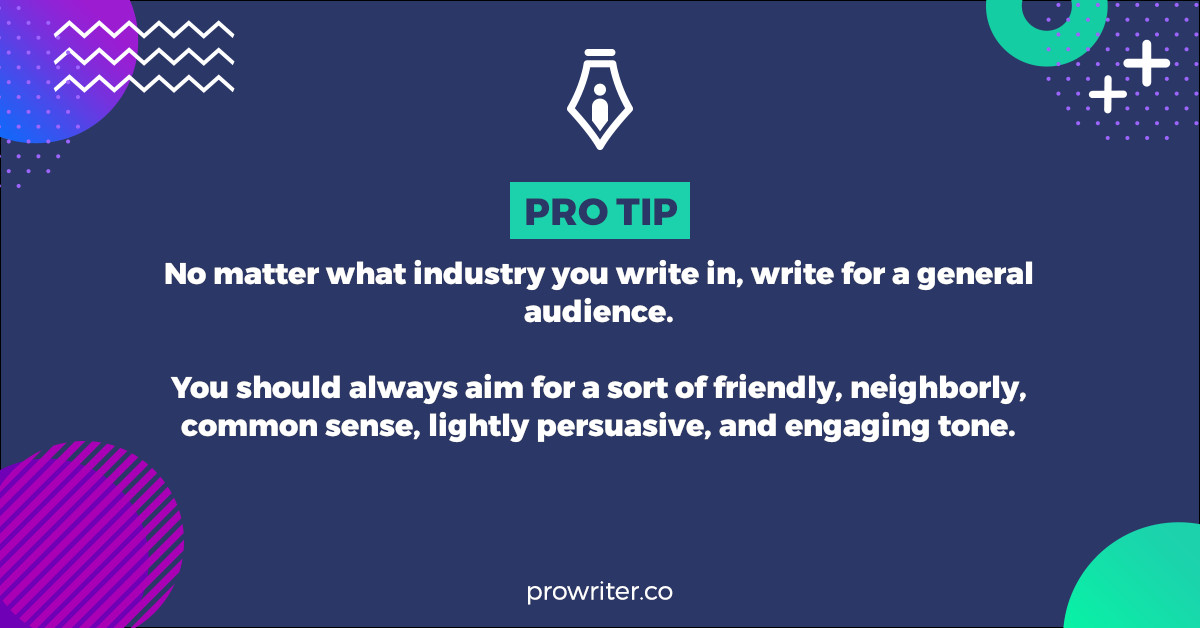
We’re not going to be able to cover even a sliver of what professional writers need to know about SEO here.
But yes, most professional writers, whether you work for a B2B or B2C blog, write press releases, or work for digital publications, will need to understand some SEO.
It’s a controversial subject, though. Some marketers think writers should just focus more on natural language writing. Meanwhile, some clients think that writers are SEO gurus that can work miracles.
Our take? We fall somewhere in the middle.
Writers should know some basic SEO, but more than that, they need to understand how their role as writers fits into a larger SEO whole.
Good SEO requires a lot of things, most of which aren’t a writer’s responsibility; these include things like a site’s loading speed, or mobile optimization.
But good SEO also requires relevant, high-quality copywriting. That’s your job.
Writing good copy that Google loves won’t make up for a poorly-designed site. But badly-written content won’t rank. Ever.
It’s also important for writers to understand bad SEO so that they can be referees with clients who have unrealistic expectations.

Every new client you run into will have their own ideas about how SEO works.
Early on, you may even unwittingly take a job for a client that asks you to use black hat SEO tactics.
Maybe the client is sleazy, and they think trying to “game” the Google algorithm will get them a short-term win.
Or maybe they just innocently heard about an SEO “hack” they think will help them, and don’t realize what a stupid mistake they’re about to make.
Whatever the reason, black hat SEO tactics all lead to the same outcome: a client’s website being permanently banned from Google, and serious online reputational damage.
What are you going to say about it? If you’re a “learn as you go” writer, probably nothing, because you probably won’t know any better.
But then imagine what happens next. Imagine accidentally taking those black hat SEO skills you just innocently learned on the job to a new client.
And then that client gets blacklisted by Google because of your writing.

The point is, writers should understand SEO insofar as it relates to their job:
And, of course, develop an eye for black hat SEO that can hurt your clients.
Again, you should be the content expert, not your client.
We have a whole lesson dedicated to the technical aspects of SEO writers should know in our free course. We strongly recommend checking it out.
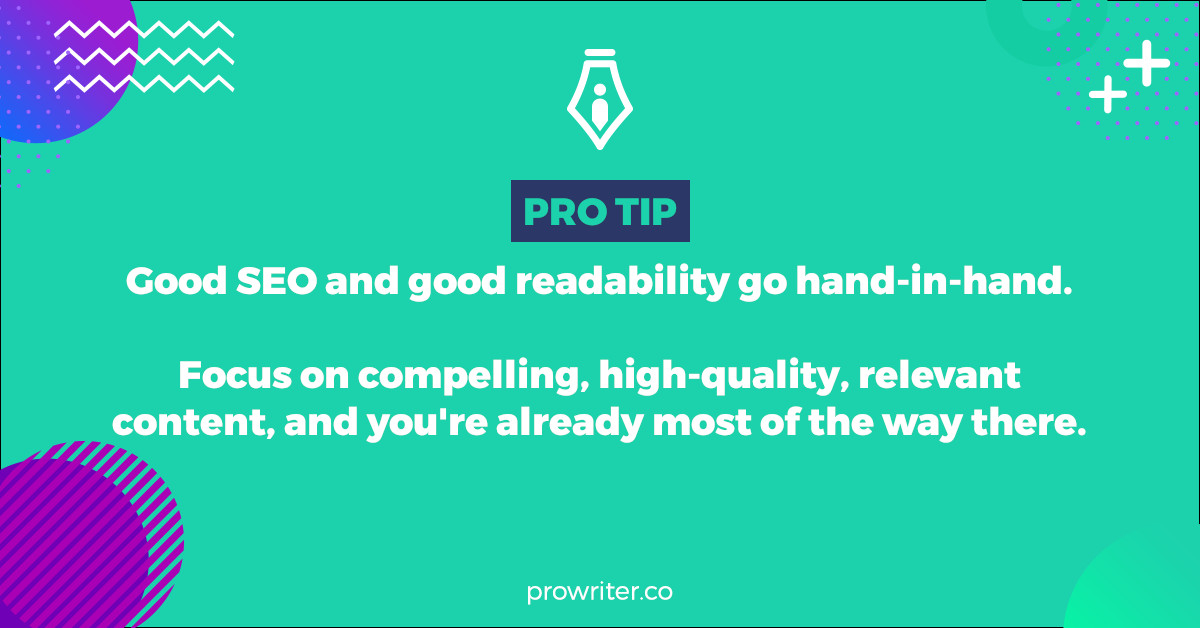
Every article you write needs to be thoughtfully and meticulously designed to pull in a reader’s attention and sustain it. This means that your introduction, or first 100 words, need to get a reader’s buy-in fast.
How fast?
According to well-worn research, readers typically need to be impressed with a piece of content within the first 10 seconds to keep reading.
You know the famous 5-second rule when you drop food on the ground? Apply a similar logic to your reader’s attention span. Those first sentences are critical.
Once you’ve got that attention, you have to keep it.
Remember your job as a freelance writer: Your job is getting a reader engaged and keeping them engaged.
“Engagement” is an umbrella term for the copywriting and persuasive tricks you employ in your copywriting to keep a reader focused.
Why do you need to keep them focused?
Because most pieces of content will ask a reader to do something.
Maybe your client will want to drive readers to a “call to action” or CTA, like “call us today” or “sign up for our newsletter.”
Maybe you have a client who makes money on affiliate marketing, meaning they have custom links to products on Amazon, and you need to suggestively “sell” the link to a reader.
Even if you work for a digital publication writing listicles, you’ll need to use soft CTAs to keep readers clicking through slides, or to get them to read another article.
The point is, as you write, think of organic opportunities to keep readers engaged.
What do you want to do with their attention? What’s your client’s final goal?
Fill out a form?
Click a link?
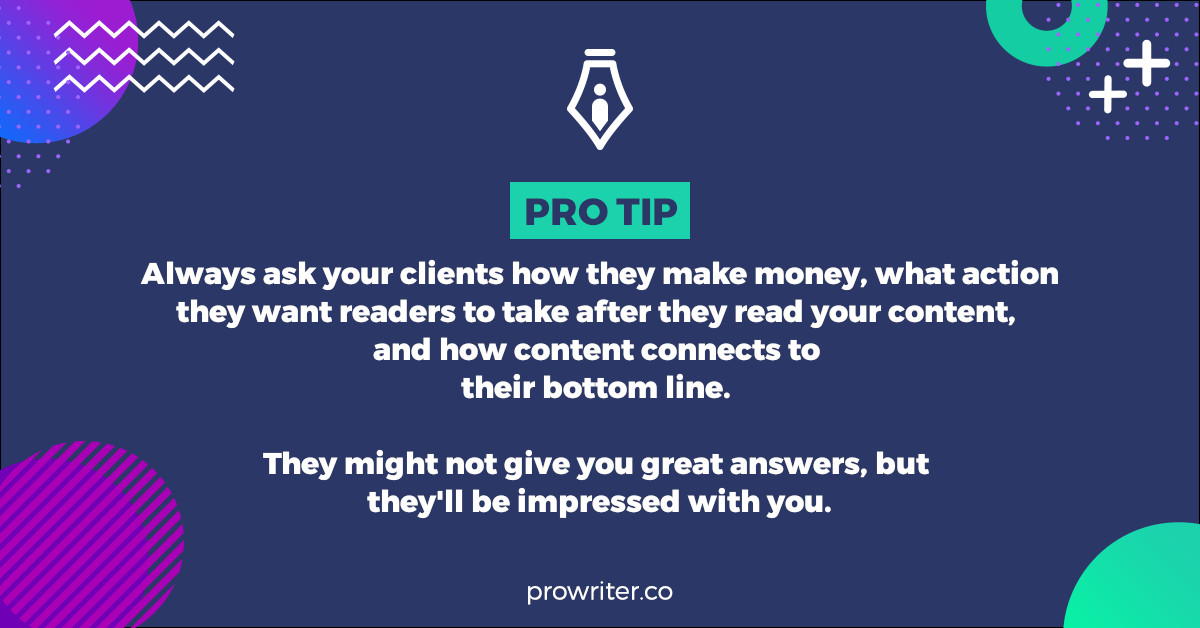
That wraps up our look at skills, for now. But it’s only the beginning of your professional development as a freelance writer.
If you’re looking for more resources on hard skills writers need to learn, we have a free course that goes more in-depth and offers practical tips for these and many other skills writers need to be competitive in this day and age.
See that? That was a CTA.
Moving on!
Before we start here, I want you to commit a phrase to memory: “proof of concept.”
In contrast to the section on skills, which as you can tell by now was just an appetizer for a much larger world that you’ll spend years exploring and mastering, this section will be quite short.
That’s because it is laser-focused on one, simple idea: the importance of creating and managing a writer portfolio.
Now, this is pretty common advice for freelance writers.
But I haven’t seen anyone explain why the portfolio is so critical to strategic career growth. What’s more, I’ve never seen an explanation for how much a good portfolio matters to employers.
To give you some context for this, when I used to post job ads as an employer myself, I’d typically get hundreds of applicants.
Yes, hundreds.
I had to develop a system for quickly weeding out unqualified applicants. I’ll go into this a bit more in the next section to help you avoid those red flags when you apply for jobs.
But suffice it to say, this system helped me invalidate 90% of all applications I received.
90%!
One of the key red flags that put an application into the recycle bin was a lack of a professional writer portfolio.
Most writers just sent a handful of links in the body of the email. Some writers sent Google Doc folders with Word Doc samples. Some didn’t send anything at all.
Those ways are all wrong. There’s one way to do it right. And that’s with a professional online writer portfolio.
For professional writers, how you showcase your work online is just as important as the work you do.
Your portfolio is a weapon. It’s a strategic advantage. Just having one already puts you ahead of 90% of all applicants. It's the home base for your career.
It’s your batcave.

Why?
Proof of concept.
To stand out amongst hundreds of applications, and to help an employer feel good about hiring you, they need to know:
Do not try to become a professional freelance writer without some kind of portfolio.
Even if you don’t have many links or samples yet, you need to figure out something. You need to present an air of professionalism. Take yourself seriously, and employers will too.
Now, how do you do that?
Create a website
It’s pretty simple nowadays to create a static content writer website using Wordpress. You can download themes that are pretty much pre-baked and only need a couple of image and copy tweaks.
Here’s a list of good themes that are easy for people with little-to-no website experience to figure out.
The downside is that creating a website and keeping it updated can be intimidating, no matter how easy someone like me tells you it is.
I’m no website guru myself, and I’ll admit that even simple websites I’ve created in the past still required several full days of troubleshooting and setup. Then, manual maintenance every week or so thereafter, whether that means updating plugins or adding new media.
It can be tedious, and if you fall behind on keeping the site’s content fresh, it can get stale and stop really working for you when it comes to getting jobs.
So if you’re more in the “hey, I really don’t want to manage a website” camp, read on.
Use a professional online writing portfolio
There are numerous options for creating an online writing portfolio.
While the most obvious is LinkedIn, I’ve found that some employers are reluctant to look at LinkedIn profiles for applicants they don’t know, since the site notifies users of others visiting their page.
Additionally, LinkedIn emphasizes other features over your writing portfolio, since it’s meant to be both an online resume and a social network.
I think it’s a good idea to include your LinkedIn when you apply for gigs (it’s more proof of concept that you are a professional writer), but you should also have a separate online writer portfolio exclusively dedicated to showcasing your work.
There are other options for this kind of portfolio, but naturally, we’re going to recommend ProWriter’s writer portfolio.
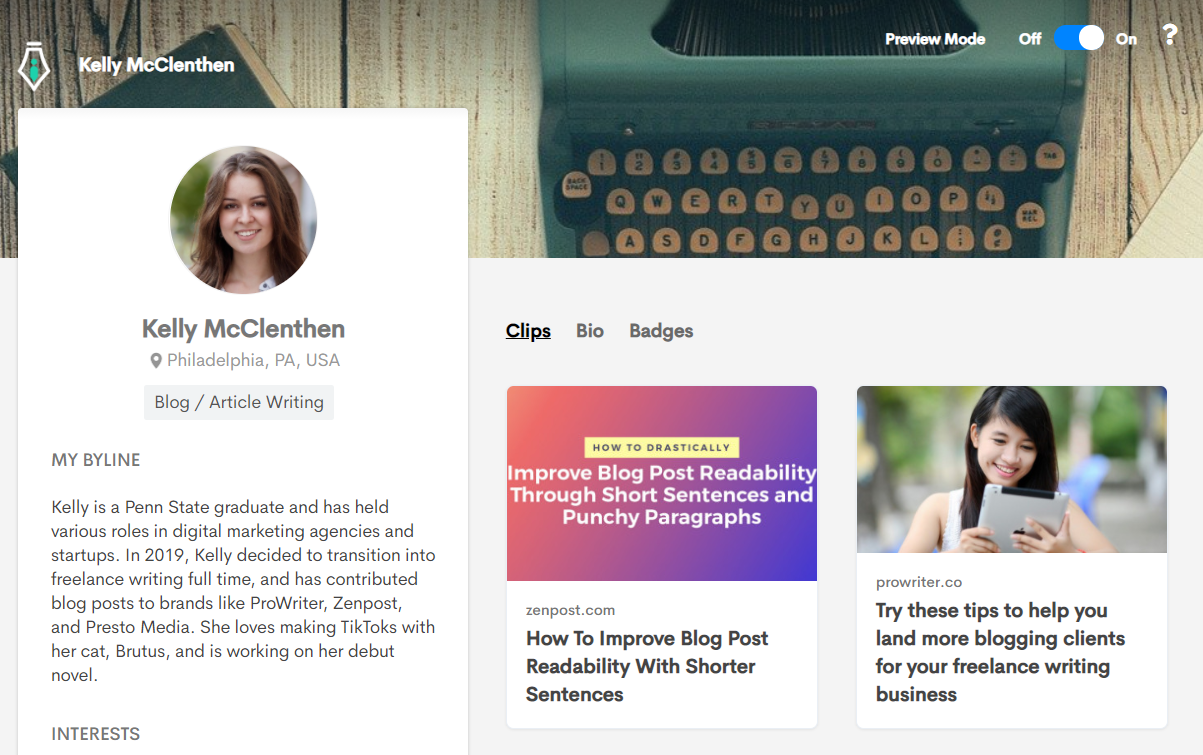
It’s free, customizable, and attractive, and it makes it easy to quickly add your recent work.
But what’s really special and different about the ProWriter portfolio is that it was designed with the employer in mind.
It tells an employer everything they would want to know about who the writer is, their experience and interests, and what their digital footprint looks like, all on one intuitive page.
.png)
Writers can also apply for verification, which, just like Twitter, involves a ProWriter team member verifying the identity of the portfolio owner, and granting the portfolio a verified badge.
.png)
Why is this important?
Believe it or not, some writers do steal links from other portfolios and pretend to be someone they are not.
It’s hard and time consuming for employers to verify the identity of each writer that applies to their gigs. We designed the verification process to help employers with that step.
Believe me, as someone who used to hire writers, this cuts down the vetting process dramatically.
You can also upgrade to unlock skills badges and other features that strengthen your verification.
Remember, proof of concept. ProWriter’s portfolio was designed with this in mind, which makes it unique among other portfolio options.
You can claim your free profile here, but before we wrap up this section, I want to at least steer you off some portfolio red flags that will get in the way of your job hunt.
With the right skills and the right tools on your side, all that’s left is a plan for growing your career in that first 12-18 months. That’s up next!
The first 12-18 months of your freelance writing career is time that you’ll never get back.
This is why we’re skeptical of the whole “ahhh, you’ll figure it out” approach.
.gif)
We’ll just come out and say it: Professional freelance writers need a strategy. Start with a mission, with a goal, and you’ll end up where you want to be much faster.
If you go in blind, you’ll lose that precious time, and spend 12-18 months banging your head against the wall.
For some of you reading this, that might be where you are now. That’s okay! Just don’t waste any more time. You know better than anyone that you will never get it back.
Freelance writers need to make careful, strategic moves that set themselves up for the long haul.
We won’t lie to you. It’s hard. Just like eating your veggies or putting away money into a savings account.
Yes, you might need to take low-pay clients or other side hustles while you figure it out.
But it’s either 12-18 months of hard work or 12-18 months of nothing happening, and you giving up. Which one do you prefer?
“Okay,” you say after taking a deep breath. “What do I need to do?”
Like we said in the previous section: proof of concept matters more than anything to an employer.
The best way to demonstrate proof of concept is to show work that was published by another employer with your name on it.
Bylined content shows a new employer:
Again, you might need to take un-glamorous, ghostwritten, low-pay content mill work early on to pay the bills. That’s fine.
But don’t get stuck there. If that’s all you do for 12-18 months, you’re no closer to getting better jobs.
Look for opportunities to get bylines, or ask your clients for bylines. Starting out, if you have to work for lower pay or even submit a few articles for free somewhere, do it. Because having your name on good content helps you grow your career more than anything.
Your future employers don’t know how much you were (or weren’t) paid for bylined content. They don’t know whether you have a good or bad relationship with the publisher.
All they know is all they need to know — that’s your name on a great piece of content.
No matter how good your ghostwritten samples are, your prospects are going to have a nagging doubt about the authenticity of the content. And if they have another, more qualified applicant with their name on quality content, that’s who they’re going to hire.
No matter where you start, find ways to get your name on good content.
If you’re just starting out, write 2-3 articles on Medium exploring topics in niches you want to apply for.
Obviously it’s better to have a bylined sample that an employer published, but having your name on some quality, self-published work is better than nothing.
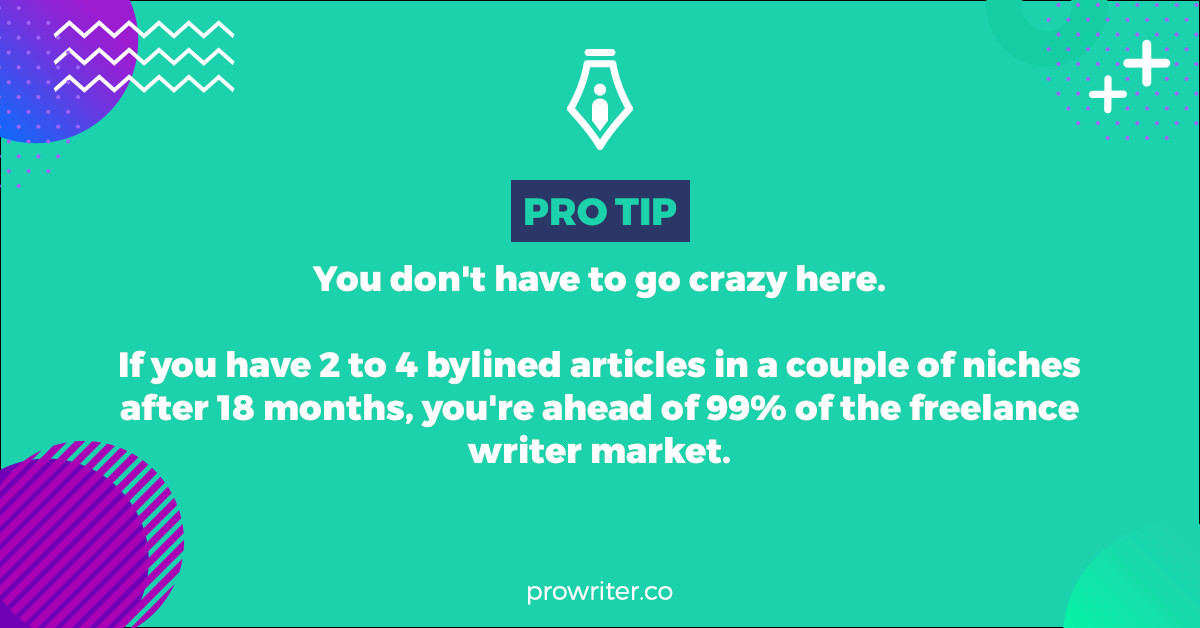
Early on, you should really sit down and come up with a “business plan.”
Because if you’re a professional freelance writer, you are a business owner. Your product is you. You are also your own boss. You are also the sole employee.
Basically it’s a small business. The backbone of the American economy!
.gif)
In all seriousness, you need a plan. It doesn’t have to be that complex. But think of all the things you need to do to manage your business, and how you’re going to split your time.
Ask questions like:
The job of a freelance writer is so much more than writing as many articles as possible to get as much money as possible.
It’s a complex intersection of business development and managing incoming revenue.
If you’re an entertainment blogger, I’d even factor in your time spent watching TV and listening to podcasts as part of your research and topic ideation time.
Even your scrolling and posting on social media can be part of a networking and marketing strategy.
Do you think that opinion journalists spend all day slinging takes on Twitter because they have nothing better to do?
They’re trying to cultivate an audience to promote their work! The bigger the audience, the more they get paid!
There has been a lot of ink spilled about the art of the pitch.
Some articles online provide pitch templates they swear by. Others just generically tell you to “keep your chin up, and keep trying!”
Templates can be useful, but be careful. A good template can’t make up for bad content.
Persistence is good advice. You will definitely hear a lot of “no.” So much “no” you might be wondering if this is the right career for you.
But keep at it. Everyone hears that much “no.”
.gif)
You might also send a lot of pitches that just… don’t go anywhere. If you send 10 pitches a day, it’s very possible that you get a polite “no” from two, a “yes” from one if you’re lucky, and 7 “nothings.”
This is all to say, pitching can be discouraging.
Especially when you’re just starting out and don’t have much, if any, experience.
So what should you do?
Our biggest piece of advice is to pitch to your strengths, and ignore your weaknesses.
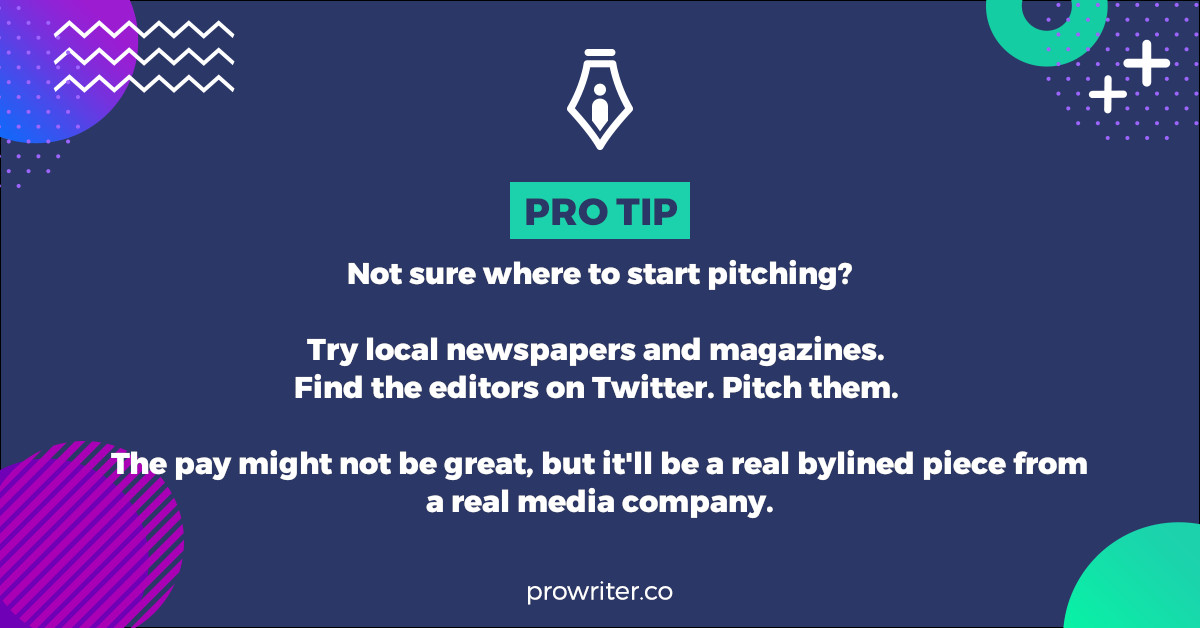
Remember, ProWriter approaches the problems of the freelance writing market from the employer side. And I can tell you with full confidence that most employers are desperate for reliable talent.
You wouldn’t believe how many ALL CAPS pitches that sound like they were written by used car salesmen employers get each day.
Sounding like a real human being who can string a sentence together is the first hurdle you need to clear in a pitch.
But from there, you can definitely shoot yourself in the foot. Here are a couple things to avoid:
“Yes, but how do I write a pitch that a client will like and approve?”
You can use templates you find on the internet, but honestly, whether or not a pitch gets accepted comes down to three criteria:
That’s it.
There’s really not much more to it than that.
Number three is out of your hands. But if the pitch is good, maybe the prospective employer will reach out to you some other time.
Number two is about developing skills and strategically growing your career, everything we’ve talked about so far.
Number one can be tricky.
Some writers are afraid of pitching fresh ideas or angles because they think that an employer will just steal their idea. They tend to split the difference and promise ideas after a hiring arrangement is made.
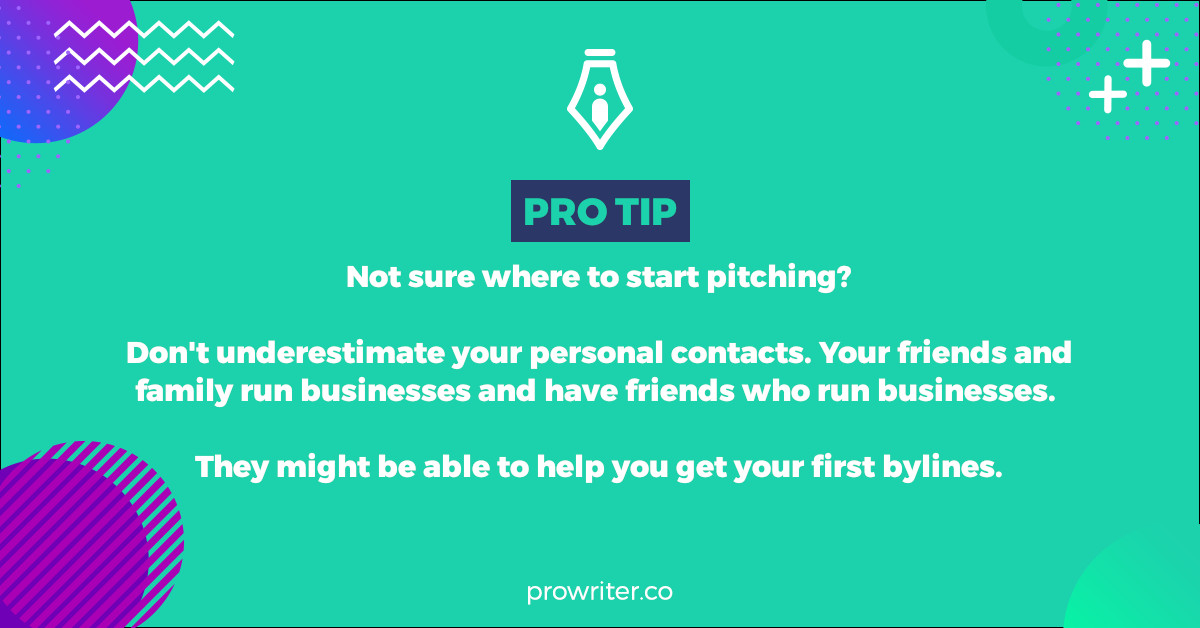
This might be doable if you have a deep portfolio of great content in a given niche. But in my experience, for writers with minimal experience, this approach will not work.
Most employers don’t have time to write their own content, which is why they hire freelancers. Sure, it’s possible an employer here or there will take your idea and run with it.
That’s okay. Ideas are cheap. You should have a hundred a day.
Execution is everything.
The two most likely outcomes are either the employer doesn’t hire you/doesn’t get back to you, or hires you to write the article you pitched.
Lastly, organize a system for tracking your pitches. A simple Google spreadsheet will do. Log who you pitched, when, and when you should follow up.
When following up, don’t be a pest. Send one follow-up a week after your initial pitch. If you don’t hear back on either email, cut your losses for now.
If you do hear back, you’re allowed one further follow up a week out.
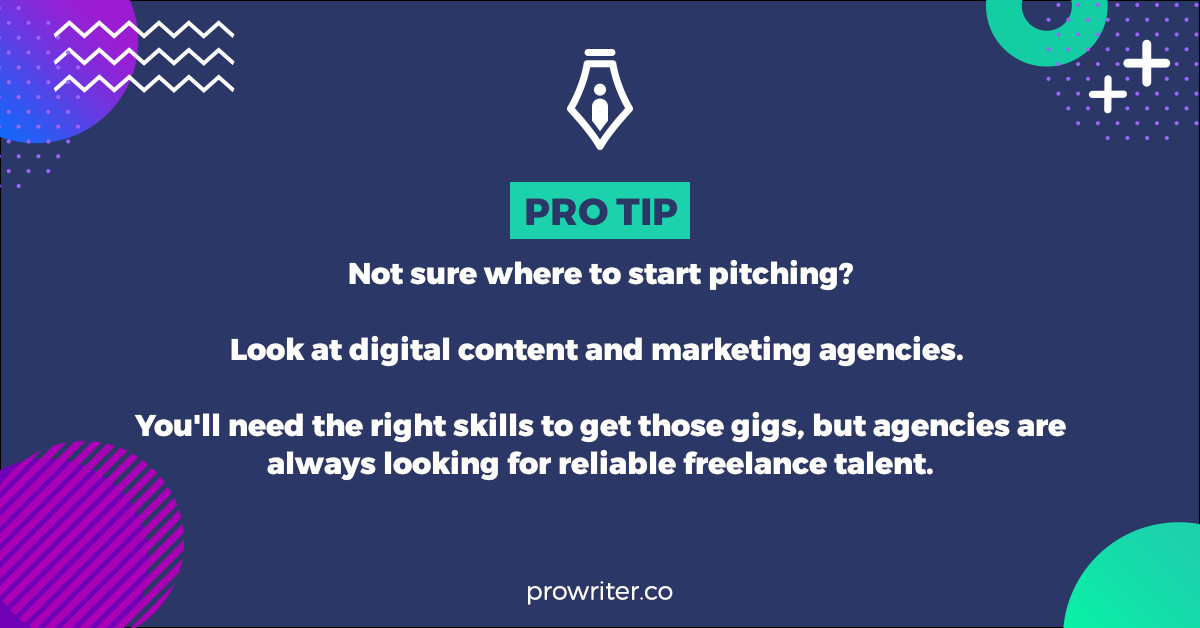
Remember, you will hear a lot of “no.” But you shouldn’t be in a situation where you have no jobs for months and months.
One freelance writer survey showed that 31% of writers can find at least one writing gig per day.
Manage your expectations, and if you’re having zero success for long periods of time, you might need to change your game up — where you’re pitching, what kind of samples you’re sending along, the niche or industry, and the content of your emails.
A couple of final thoughts before we go.
If your feeling after reading this is that freelance writing is too hard and you’ve made some kind of mistake, here are some words of encouragement:
Freelance writing seems difficult, in part because there’s no clear path. You don’t go to college and get a degree in freelance writing and then get hired as a full-time freelance writer somewhere, like in other careers.
But you don’t need that in this field. You just need someone to tell you what employers actually want, how to develop those skills, and how to grow your career.
You didn’t screw up.
But you do need help.
And it’s okay to admit that.
Because even though there are tons of articles and resources out there about helping you launch your freelance writing career, it’s hard to find exactly what I think you’re looking for.
You’re looking for straight talk from employers about what they actually want, and then practical, easy-to-digest training in the skills you actually need to give them what they want.
Like we’ve said several times, there’s a clear gap in the marketplace between what writers can actually do and what employers want. There’s a huge gap in skills in the freelance writing market.
Anyone who tells you to just “figure it out” is setting you up for failure. We hear it all the time from employers. Good talent is hard to find, and they don’t want to pay writers to “practice.” They have deadlines and they need professional content they feel confident publishing.
Become a professional.
Become the smartest content guru in the room.
Freelance writing is a JOB.
It involves the exchange of your time and labor for money.
It’s not a HOBBY.
In summation:
You didn’t screw up. Writers can make a good living.
If you’ve been at it for 12-18 months and feel stuck, then maybe it’s time to change up your game. Apply some more strategy. Get serious about this as a career, and yourself as a professional.
Don’t give up.
This has been a long journey, and while we’ve only scratched the surface, everything in this article should help you get off to the best possible start.
If you want to go deeper into any of these topics, please explore ProWriter’s resources and courses page. You can also sign up for our Who’s Hiring? Newsletter for a weekly email digest of new writing gigs and other resources.
Lastly, ProWriter is on a mission to improve the experience of freelance writers so they can get more of the jobs that they love.
Please email [email protected] with any suggestions you may have, including:
Good luck out there, and happy hunting!
Sign up right now and get full, immediate access to ProWriter’s library of resources and marketing tools. Heck, you might even land your first paying client today!
